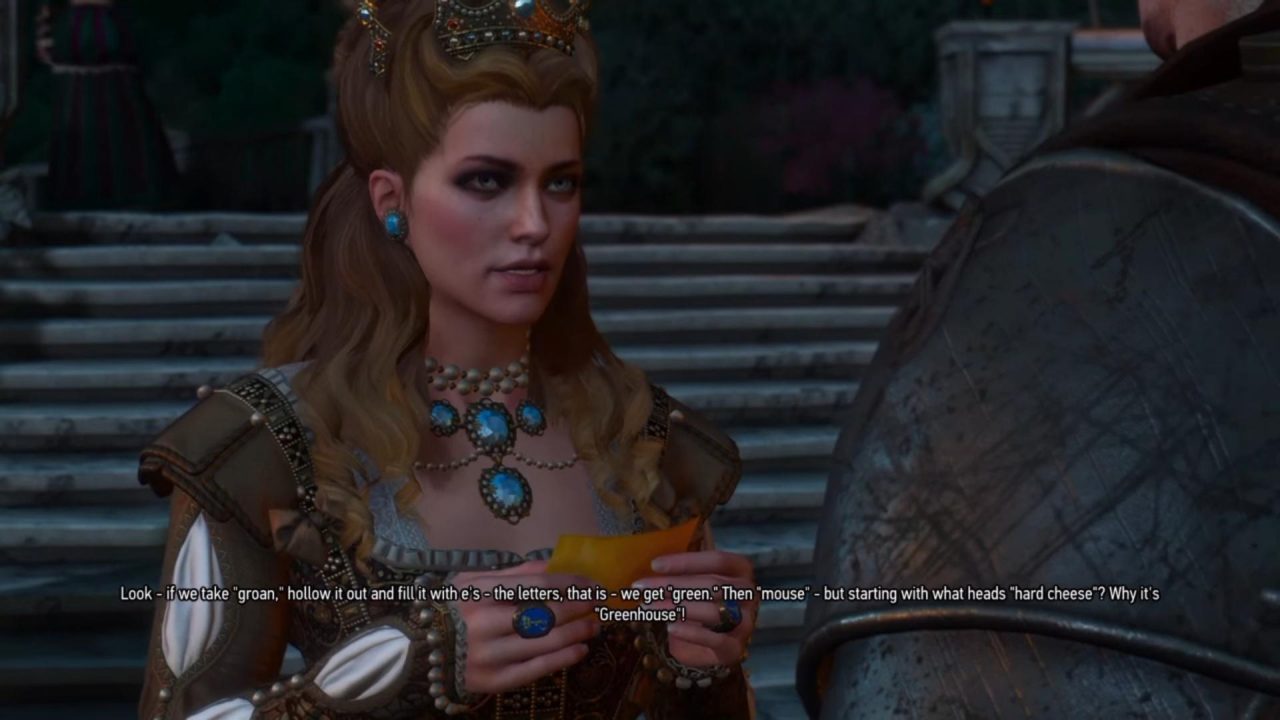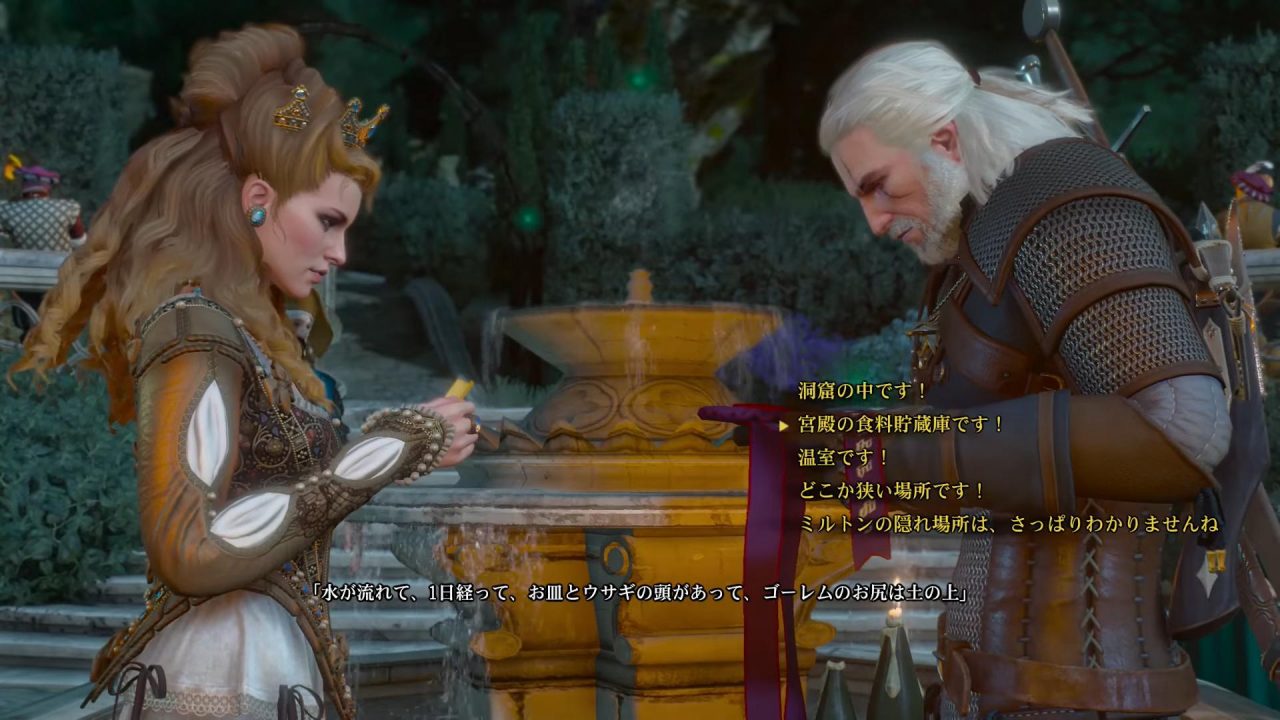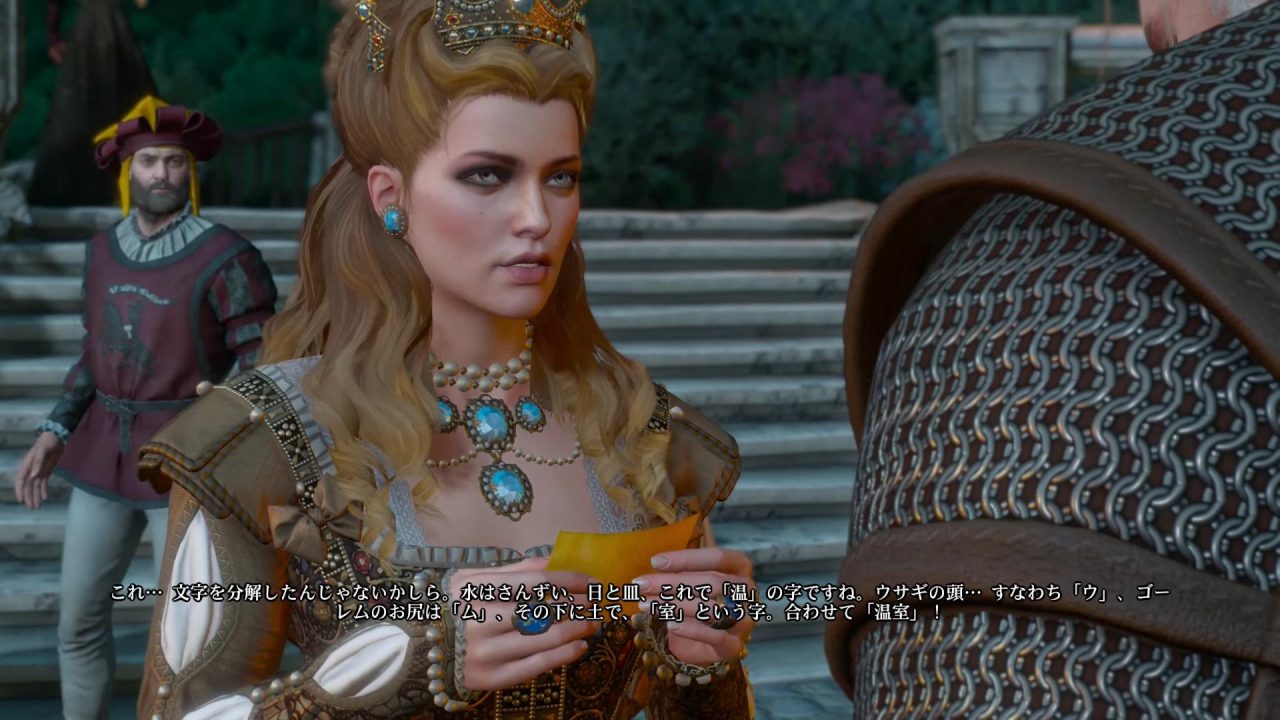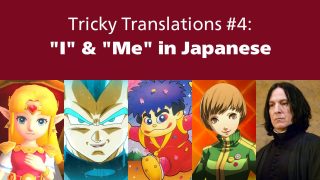There’s a DLC quest in The Witcher 3 that revolves around a very language-specific, nearly untranslatable riddle. I’ve only played the English version of the game, so I was curious to see how the riddle works in Japanese. Let’s take a look!
English Riddle
At a gala during the “Beast of Toussaint” quest, you need to solve a riddle to find where another character is hiding. In English the riddle is:
I begin like a groan hollowed out with ease, then end like a mouse with a head of hard cheese.
The first part of the English riddle works this way:
- Hollow out the word “groan” to create “gr__n”
- Fill the hollow area with Es (rather than “ease”) to get the word “green”
The second part of the riddle works this way:
- Take the “head” of the phrase “hard cheese”, which is “h”
- Make that “h” the “head” of the word “mouse” to get “house”
Then, combining the two words, you get “greenhouse”.
The words used in the riddle are also meant to throw you off when you get to choose your final answer. Because the riddle involves mice and cheese, for example, you might think it’s referring to a place where food is stored. In short, the wording of the riddle is meant to lead you to the word “greenhouse” while also pushing you toward specific incorrect solutions.
Japanese Riddle
As we can see, the English riddle works by playing with the spelling of English words. But how do you translate something like this into another language? An ordinary, literal translation of the English riddle would make zero sense in other languages, after all.
Rather than focus on the literal words of the riddle, the Japanese localizers focused on conveying the original intention instead: playing with the current language’s writing system to produce the answer of “greenhouse”.
The first part of this Japanese riddle suggests combining the following characters:
- 氵 (indicates “water”)
- 日 (“day”)
- 皿 (“dish”)
There happens to be a simple Japanese character that contains all three pieces: 温, which means “warm”.
The second part of the Japanese riddle takes a bit more explanation but is similarly broken into three parts:
- First, the Japanese word for “rabbit” is ウサギ (usagi), the “head” of which is the character ウ
- Next, the Japanese word for “golem” is ゴーレム (gōremu), the “rear” of which is the character ム
- Lastly, the character for “earth/ground/dirt” is 土
As before, the riddle suggests combining the indicated characters, which in this case are ウ, ム, and 土. And there is a Japanese character that roughly contains all three stacked on top of each other: 室, which means “room”.
Putting our two full Japanese characters together gets us 温室 (onshitsu), which means “greenhouse”.
The Japanese riddle is basically completely different, yet still leads to the same solution. At the same time, some of the words used also deceptively point to incorrect solutions. The use of the word “earth” seemingly suggests the cave answer, for example.
In this way, the Japanese riddle is different from the English riddle, yet works in its own unique way to follow the spirit and goal of original riddle. It’s a good example of localization at work – a creative solution to something that doesn’t work in a literal translation.
Japanese Reactions
It appears that the Japanese version of this riddle often gets mentioned when gamers discuss good English-to-Japanese game localizations. Just for fun, here are a variety of comments from Japanese articles, message boards, and Twitter, translated into English:
Just a phenomenal translation. This is originally a Polish game?!
Witcher 3’s translation really is exquisite. Every time I see such carefully crafted localization choices in it, I can’t help but feel that the translator (or whoever directed the translation) was a true blessing for this Western game. They loved not just the game itself, but every single bit of writing in the game too.
Every once in a while I run across such great translations in the Witcher that make me wonder “What could the original text have been?”
I never expected to see a kanji-based riddle in a Western game. What an incredible localization.
I didn’t realize it was a kanji riddle at the time, but I managed to get it right just by the general feeling of the words used. I bet a lot of people were confused though, not expecting the localization to be that thorough.
I never expected a game from Poland to have a kanji puzzle…
Translating the intention so the answer would still be “greenhouse” in a way that makes sense with Japanese kanji – that shows some serious talent
There are some incredibly crappy Japanese translations like Skyrim has, but some Japanese translations are amazing, like The Witcher’s. “Greenhouse!” No other Western game translations are on that level!
Final Thoughts
I haven’t finished The Witcher 3 yet in English, but after looking at this one little topic I already want to replay the entire thing in Japanese sometime. Plus, as touched on in this older article, it sounds like the Japanese version is considered legendary. I wonder what other localization gems are hiding in there.
Now that I think about it, I’m sure you could write 80 books about all of the various localization choices and differences between all the versions of just this one Witcher game. I hope someone does someday. For now, if you know how this riddle worked in the Polish version or in any other languages, let me know in the comments!
Incidentally, if you're interested in English-to-Japanese game translation stuff, here's a summary of what Japanese players have said about other Japanese-to-English game localizations.
Or, if you've ever wondered if Japanese gamers have their own "ALL YOUR BASE ARE BELONG TO US"-esque translations, see here!






![Passport to MOTHER 2 [Learn Japanese!] Passport to MOTHER 2 [Learn Japanese!]](https://legendsoflocalization.com/wp-content/uploads/2018/05/pp-m2.jpg)



The Polish riddle is different, and has a much simpler idea behind it:
Weź początek ze szmeru oraz z klekotania. Dołóż koniec z fanfar i koniec z klaskania.
Take the beginning of “szmeru” and “klekotania”, add the end of “fanfar” and the end of “klaskania”.
The correct answer is “szklarnia” (greenhouse), and you literally need to take the first/last few characters of each word to get there. The words describe various noises (murmur, rattling, fanfares, clapping). One minor thing lost in translation is that the words are in the genitive case. If you tried to switch to the nominative (a reasonable approach), you would get “fanfary” and “klaskanie” at the end, which would put you further away from the solution. And, because our grammar is a lot of fun, “In the greenhouse” becomes “W szklarni” (locative case).
I came here to comment that since it’s a Polish game the English is itself a translation and was curious to know the original. Thanks for sharing that!
This is some very fascinating stuff. You have to appreciate the tremendous amount of effort that went into getting this riddle as close to the original as possible without losing a thing.
MFW I’m Japanese born and raised in Japan and still find the Japanese version of the riddle significantly more head-scratching. I mean, for sure I have no trouble getting how it works once I see the solution and it’s not like this type of kanji riddle is unheard of in RPGs but man this one is so hard. Admittedly I’m not a huge gamer but I don’t remember seeing a riddle this complicated in a video game for years. I low key believe the riddle in English is somewhat easier than the Japanese one even though such a comparison usually doesn’t make much sense? Or perhaps I’ve got too old for ingenious lateral-thinking stuff like this. I would’ve immediately booked it for Wikis for answers instead of trying to racking my brains on my own.
For the record, I would have never solved this. Something that groans and is hollowed out? A mill has a hollowed out stone and probably groans and creaks a lot. Also with all the grain they would grind in that mill there are probably mice so, I dunno. check the mill for mouse holes?
The French translation is “from the hungry mouse, I take the initial (i.e. “letter”). and end like a dark spot where one go to ground”
“mouse” is “souris”, so “s”
“go to ground” is “se terre”, so “erre”
s + erre = serre = greenhouse.
In a developer interview, they state that all translations (except Chinese and Russian, IIRC) were written simultaneously. So there isn’t really an original translation. Apparently the devs gave, essentially, guidelines to follow and let the writers do what made sense for their languages.
The riddle in Italian:
“I begin with an S, then a conjunction, two bodyless frogs and end with an A”
S
A conjunction is “E” (equivalent to the English “and”)
Frog is “rana”, so two R
A
S+e+rr+a = Serra (Greenhouse)
Here’s the European Spanish version of the riddle:
“Comienzo como el invierno, con un grito ahogado, pero acabo siendo duradero, como un ratón en verano.”
(I begin like the winter, with a drowned screech, but I end up being durable, like a mouse in summer.)
Invierno + duradero = invernadero (greenhouse). Not very smart, in my opinion.